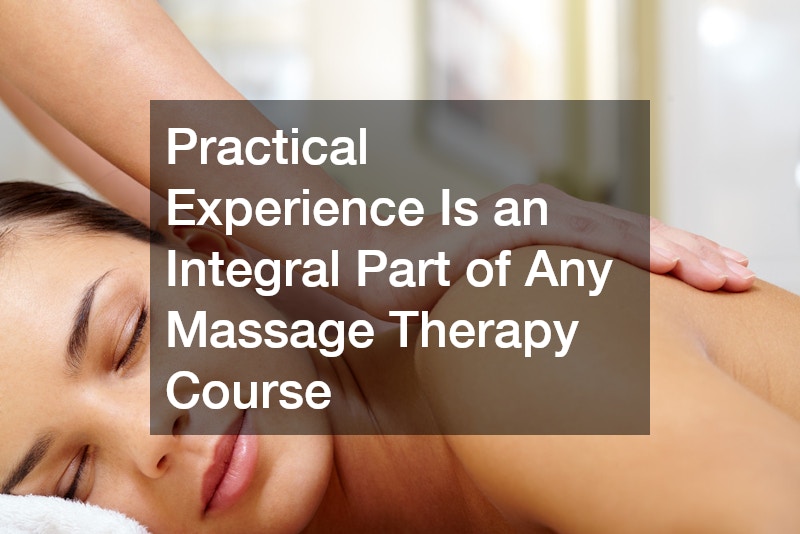As the demand for holistic healthcare and wellness continues to rise, massage therapy has become a popular career choice for those passionate about healing and helping others. Whether you’re looking to change careers or just starting out in the professional world, enrolling in a massage therapy course can open the door to a fulfilling vocation. This article explores the journey and the benefits of enrolling in a massage therapy session, providing aspiring professionals with a comprehensive overview of what to expect and how to succeed in this rewarding field.
A massage therapy course not only equips students with the essential technical skills but also delves deep into the science of human anatomy and physiology. Through structured modules and hands-on experience, students learn various massage techniques that enhance muscle and joint function while promoting relaxation and stress relief. As you consider embarking on this path, it’s vital to understand the multifaceted nature of a massage therapy session and its impact on both personal and professional development.
By completing a massage therapy course, graduates are well-prepared to enter a variety of work environments, such as spas, clinics, and hospitals, or even start their private practices. The course curriculum typically covers a wide range of topics, including Swedish massage, deep tissue, sports massage, and aromatherapy, to name a few. Additionally, students gain insights into ethical practices and effective client communication, which are critical components for building a reputable practice in the wellness industry.
Comprehensive Curriculum
A well-rounded massage therapy course covers an extensive range of subjects crucial for developing proficient therapists. Anatomy and physiology form the foundational components of the curriculum, enabling students to understand the complexities of the human body. This knowledge is vital for administering safe and effective massage techniques, ensuring that therapists can tailor their services to meet individual client needs.
Techniques and modalities are essential aspects of a massage therapy session, with students receiving training in various methods such as Swedish massage, deep tissue, and trigger point therapy. These skills are refined through practical sessions, where students have the opportunity to practice and perfect their techniques. This hands-on experience is invaluable, fostering confidence and competence as students prepare to transition into professional roles.
Beyond technical skills, a massage therapy course also emphasizes the importance of understanding the psychological aspects of therapy. Courses often explore topics such as stress reduction, relaxation methods, and the mind-body connection. This holistic approach ensures that aspiring massage therapists can not only address physical ailments but also support their clients’ overall well-being, reinforcing the significance of a comprehensive massage therapy course.
Hands-On Experience
Practical experience is an integral part of any massage therapy course, providing students with the opportunity to apply their knowledge in real-world settings. Supervised clinical hours allow them to work with a diverse range of clients under the guidance of experienced professionals. This direct interaction is critical for understanding the nuances of client expectations and adapting techniques accordingly.
During the hands-on training, students are also encouraged to gain experience in different environments, such as wellness centers and rehabilitation facilities. This exposure helps them to identify their preferred work settings and specialties, ensuring a smoother transition into professional practice. Additionally, engaging with clients from various backgrounds provides insight into customizing therapeutic approaches to suit individual needs.
A massage therapy course that prioritizes hands-on experience also builds interpersonal and communication skills, both of which are essential for establishing successful client relationships. By learning to listen actively and respond empathetically, aspiring therapists can create an environment of trust and comfort. A well-structured massage therapy session ensures that graduates have the practical skills and personal attributes necessary to succeed in the competitive wellness industry.
Career Opportunities
Completing a massage therapy course opens up numerous career prospects for graduates, offering a path to work in diverse environments. From serene spa settings to high-energy sports facilities, the options are vast and varied. Each work setting presents unique challenges and opportunities, catering to different aspects of a therapist’s skills and interests.
Many graduates choose to work in established facilities, while others pursue entrepreneurial ventures by opening their own practices. The demand for skilled massage therapists continues to grow, fueled by increasing public awareness of holistic health and wellness benefits. This trend ensures a steady influx of job opportunities, making a massage therapy session a wise investment for a secure and rewarding career.
Besides traditional roles, a massage therapy course equips professionals with the skills needed to specialize in niche markets, such as prenatal massage, sports therapy, and geriatric massage. These specializations not only enhance earning potential but also provide opportunities to make a significant impact in clients’ lives. With a comprehensive education and practical experience, graduates are well-prepared to explore diverse career paths in this fulfilling industry.
Embarking on a massage therapy course can be a transformative step for those passionate about health and wellness. The journey through comprehensive curriculum, hands-on experience, and varied career opportunities prepares aspiring professionals to excel in a vibrant and essential industry. With a commitment to continuous learning and personal development, graduates can look forward to a satisfying and impactful career as massage therapists.
Ultimately, a massage therapy session empowers individuals with the knowledge and skills to promote wellness and improve quality of life for countless individuals. As you consider this path, remember that the dedication and passion you bring to your practice will be as crucial as the education you receive. The choice to enroll in a massage therapy course is not just a commitment to a career, but a commitment to being part of a community dedicated to care and healing.
If you aspire to join the ranks of skilled massage therapists, now is the time to take the first step. With a comprehensive massage therapy session, the possibilities are vast, and the opportunities for personal and professional growth are endless. Embrace the journey, leverage the knowledge, and make a difference in the world, one massage at a time.



